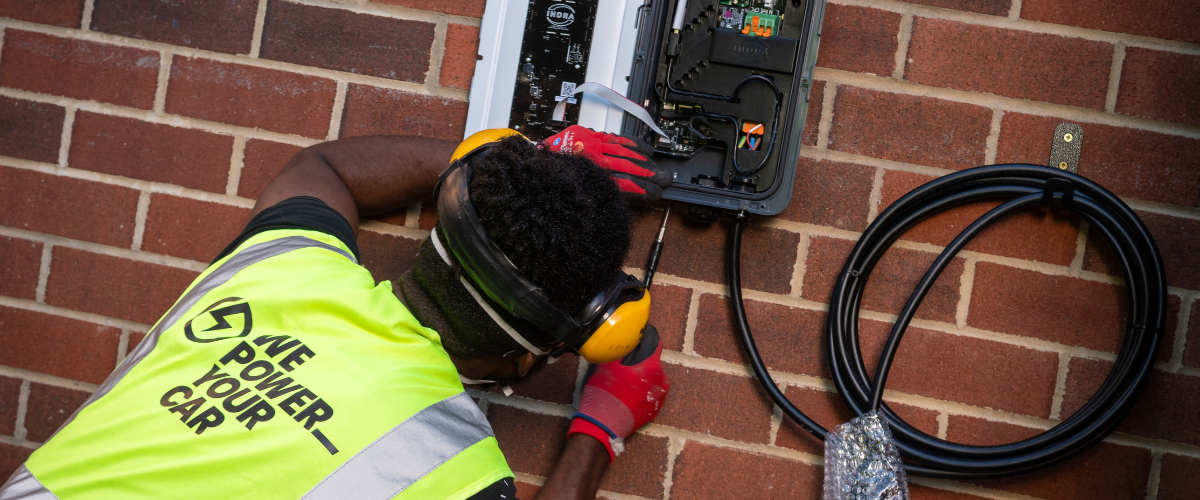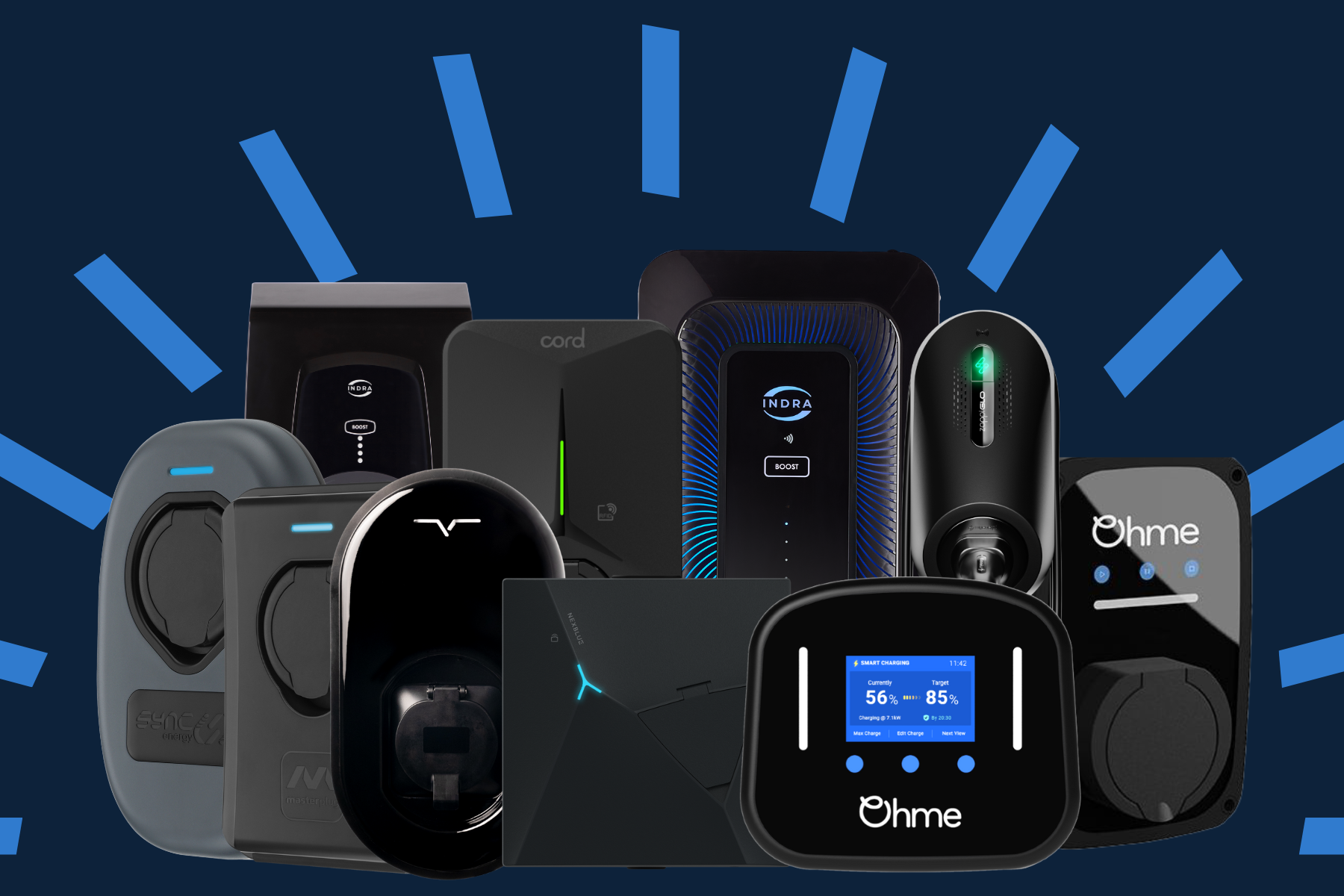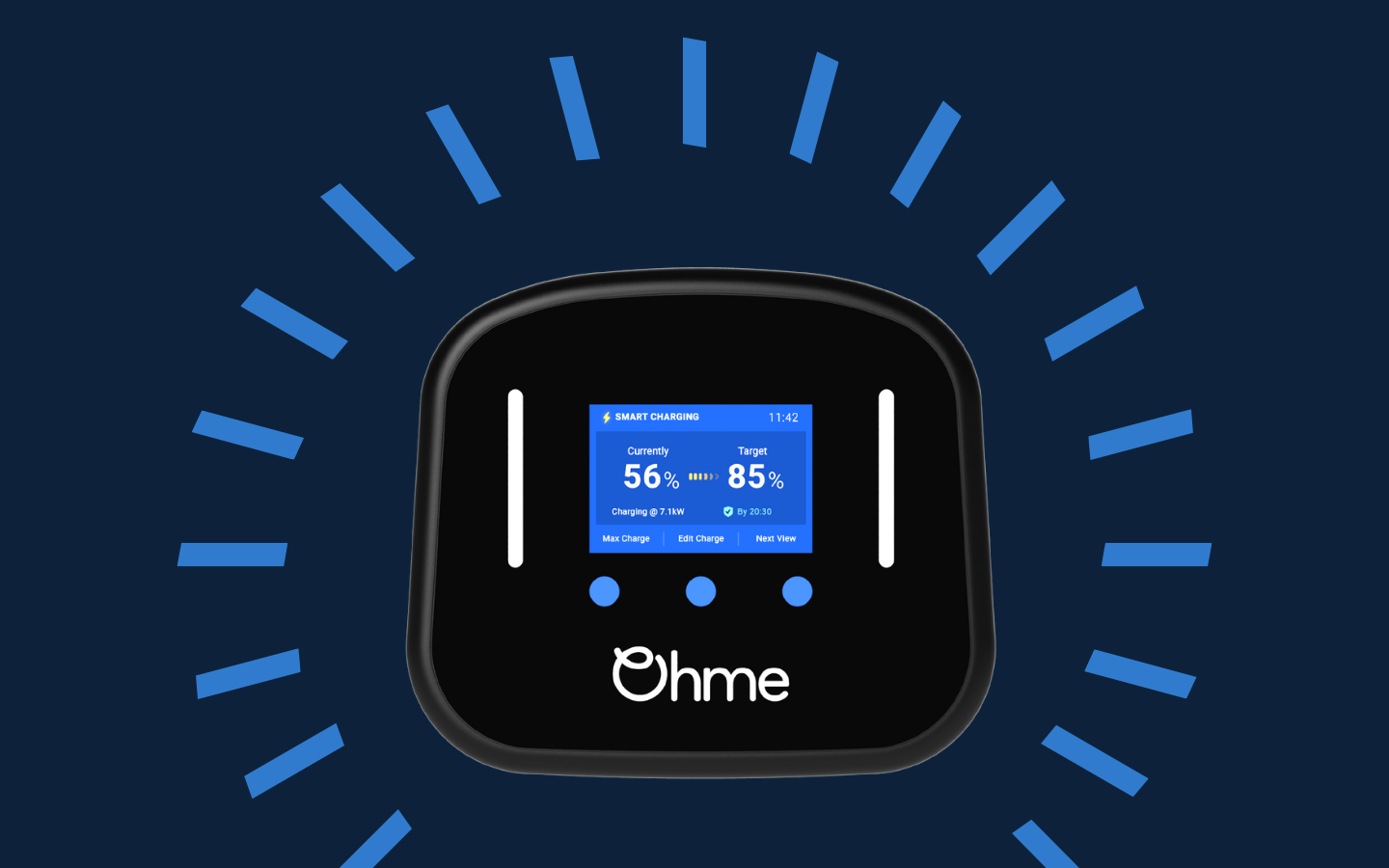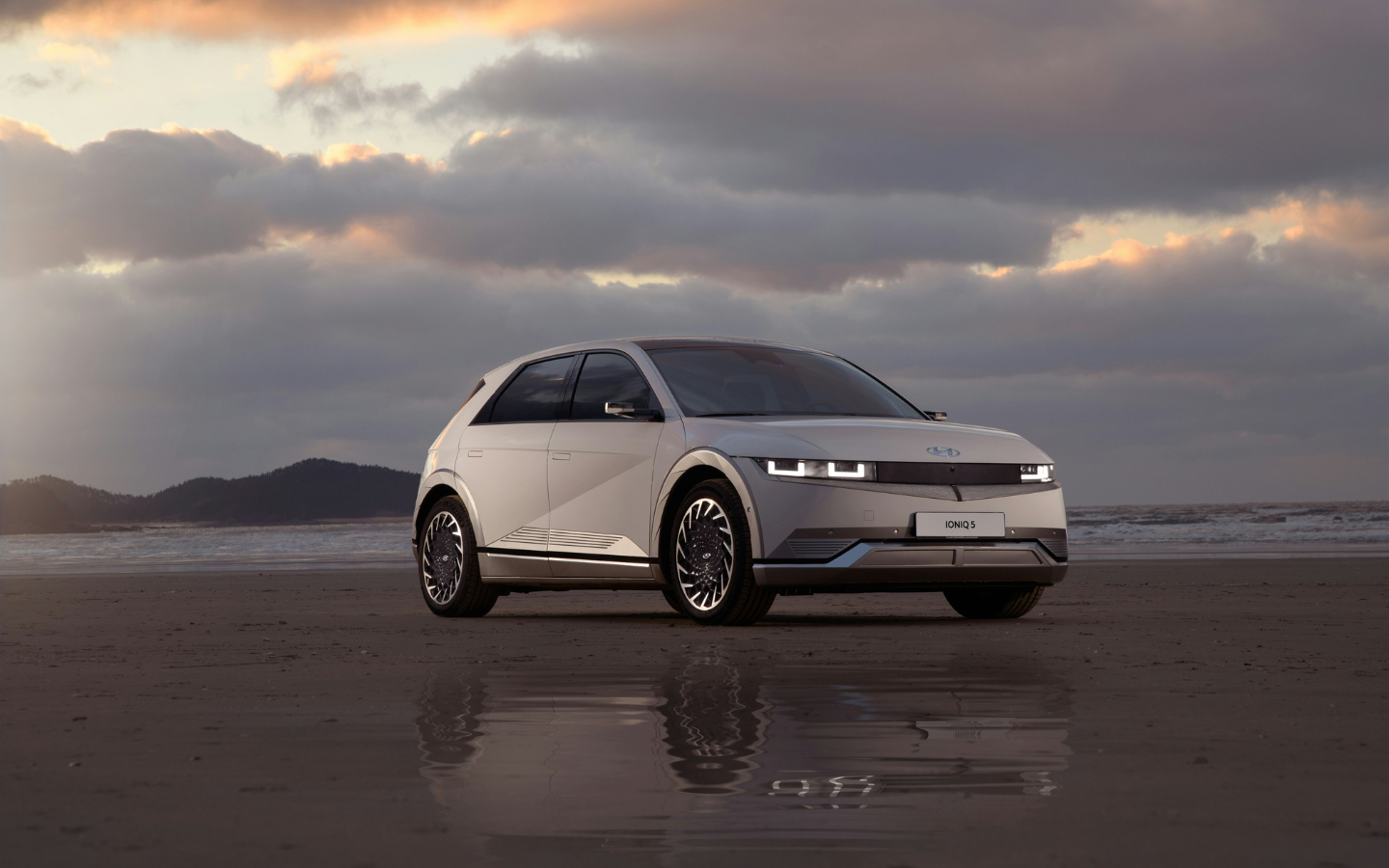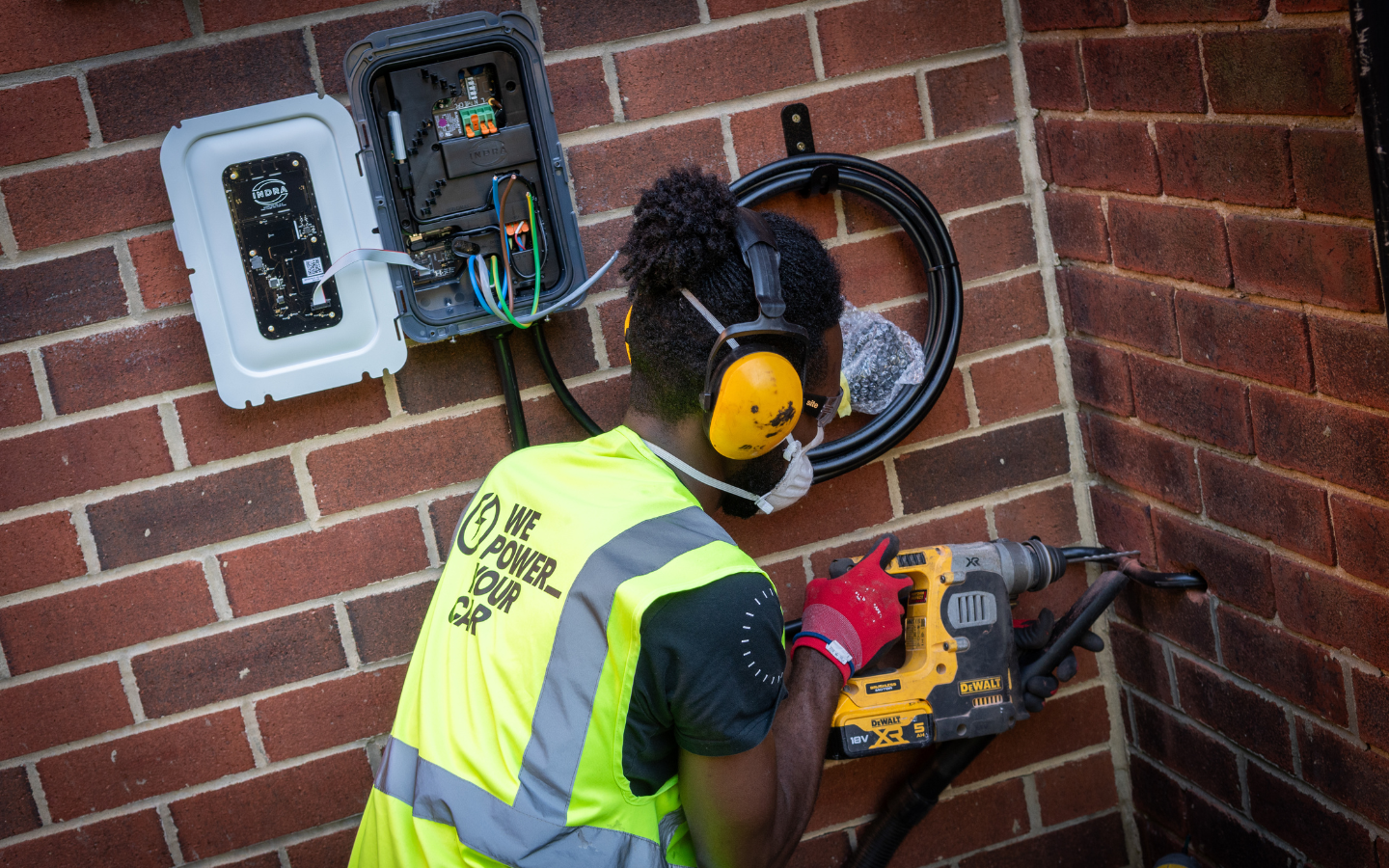

Home EV Charger Installation Requirements in the UK: A Guide
Unfortunately, installing a home EV charger in the UK isn’t as straightforward as plugging in a new appliance. In truth, home EV charger installation involves navigating important requirements and permissions to ensure the setup is safe, efficient, and compliant with regulations.
Don’t worry, though. Today, as an OZEV-approved, vastly accredited and experienced EV charger installer (25,000 charging points installed to date), we clarify the entire home EV charger installation process in our go-to, complete guide to installing a home charger.
Quick summary:
To have an EV charger installation at home in the UK, you need to meet the following requirements:
- Property ownership or landlord permission (if renting)
- Off-street parking or an adequate EV charging solution for on-street parking
- A strong, stable Wi-Fi or 4G/3G mobile connection – otherwise a dongle or booster will be required
- Approved and accredited EV charger installers (OZEV, NICEIC, Safe Contractor, as examples)
- Suitable EV charger location with plenty of room to plug in
- Suitable electricity supply: At a minimum of 3.6kW, maximum of 22kW, but with 7kW as the typical supply rate
Can I have an EV charger installed at home?
If you have an electric car, you can have an EV charger installed at home. Whether you have on-street or off-street parking, EV charger installation is possible. However, they might be slightly different and may come with their own set of caveats.
On-street EV charger installation, for example, will require additional infrastructure to be legally installed – more on this to come.
Good to know: All smart home chargers come with at least a 3-year manufacturer warranty as standard.
What are the steps to a home EV charger installation?
How to get a home EV charger installation |
||
| Step 1 | EV charger enquiry and selection | Browse the best home EV chargers on the market, and when you’re ready, enquire about your favourite, complete with installation. |
| Step 2 | Site survey | Typically completed online, through a collection of videos and images. But in-person site surveys can be done for a small fee. |
| Step 3 | Payment | Pay for your electric car charger and installation in full or spread over time with finance or Klarna. |
| Step 4 | Permissions, planning and installation date scheduling | At this stage, your EV charger installers will start putting your installation into motion. This can include notifying your local DNO, applying for any applicable grants, and finding an appropriate installation date. |
| Step 5 | Installation and handover | The big day is here. Feel free to make your EV charger engineer a cup of tea while they install your home EV charger, complete with testing and commissioning.
Don’t worry, they’ll provide a comprehensive handover after, too.
If you have any questions— Just ask. Our engineers will be happy to help at any stage. |
| Step 6 | Post-installation check-in | You’ll receive your EIC certification and compliance certificate. |
Can I install a fast EV charger at home?
Yes, you can have a fast EV charger installed at home. In fact, the typical EV charger installed at home is 7kW (classified as a fast EV charger). That said, 3kW, 11kW, and 22kW electric car chargers are also available for installation.
But the higher the kW, the more expensive the home EV charger installation is. Why? Because, unfortunately, additional work is required.
One thing to note, though, is that you can’t get rapid or ultra-rapid EV chargers installed at home. These high-power outputs are reserved for destination and commercial EV charger installation only.
How long does it take to install an EV charger at home?
In the most basic sense, the time it takes to physically install an EV charger takes around 2-3 hours, on average. This is based on a standard single-phase, 7kW home EV charger installation, excluding any additional work.
That said, the actual length of time to install an EV charger will depend upon a few factors:
- Where your charge point is installed. For example, detached garages will take longer than an installation on your drive.
- The number of electric car chargers. Double the chargers will take double the average time.
- Whether any further time-consuming work is required, and therefore more materials and labour are needed, such as routing the cabling underground.
Additionally, while 2-3 hours is the approximate timeline for a physical EV charger installation, the lead time for a home charger EV installation from start to finish is much longer, sitting at about 2-4 weeks in 2026.
In fact, EV charger installations can take weeks, if not months, to plan, schedule and handle the necessary requirements and permissions for a safe, legally compliant electric vehicle charger installation.
We recommend purchasing your electric car charger and installation before or as soon as you’ve bought your EV to avoid disappointment.
How much does it cost to install an EV charger at home?
In short, the cost of installing a home EV charger in the UK depends on a number of key factors: the power outlet of the home electric car charger you choose (7kW, 22kW, etc.), grant eligibility, and the complexity of the installation.
That said, the ballpark price for the cost for installing a 7kW home EV charger in 2026 varies from £650 to £2,000 in the UK (from basic EV home chargers to premium charging points).
Can I have an EV charger installed in my garage?
In short, yes, you can have an EV charger installed in your garage. In fact, it’s perfectly possible, not to mention safe and convenient for those who want to add an additional layer of security and also avoid wet and windy weather—especially in winter.
But it’s not as simple. Garage EV chargers require much, much, much more thought than your average home charger setup. In fact, garage EV charger installations are usually more complex and, in turn, require more work to be undertaken.
For this very reason, installing an electric car charger in a garage may lead to a higher cost of installation, especially if you would like your EV charger installed in your detached garage.
Of course, as with most installations, it depends on your property’s set-up. It’s best to get in contact with EV charger installation experts to ensure a safe, professional garage EV charger installation.
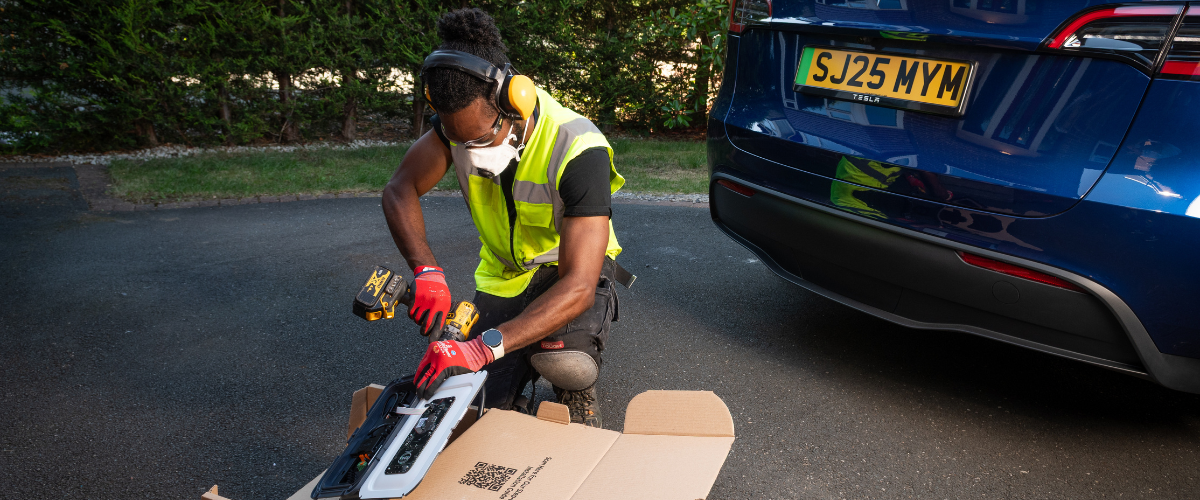
EV charger installation requirements breakdown:
1. Property ownership or landlord permission
To install an EV charge point at home, you must either own your property or gain permission from your landlord if you are renting. Landlord permission must be obtained before the installation commences – not during. This is key for residential EV chargers in flats and apartments – take note if that’s you.
2. Off-street parking or adequate on-street parking
Getting an electric car charger installed at home is easy if you have off-street parking, as you don’t require council permissions. Off-street parking is therefore essential for any standard home EV charger installation.
On-street parking, though, is an entirely different ballgame.
First, local planning and highway authorities must deem your on-street parking adequate. Second, you must also install a cross-pavement charging solution before installation and ensure you have permission from your local planning and highway authorities to do so. Coveted solutions include Kerbo Charge and ChargeArm.
A cross-pavement charging solution can raise the cost of installing a home EV charger. But the £350 Electric Vehicle Chargepoint Grant for Households with On-Street Parking is now available to lessen this.
However, it’s not all bad news. While EV drivers with on-street parking after a home EV charger still need to apply for planning permission, the rules have changed in your favour. Now, you can install an EV charger within two meters of a public highway – something that was not allowed previously.
3. Wi-Fi or 4G connection
You must have an adequate Wi-Fi or mobile connection at the location where the electric car charger is installed. You can’t have a home EV charger installed otherwise. A Wi-Fi or mobile connection ensures that your charger can access smart features and complies with The Electric Vehicles (Smart Charge Points) Regulations 2021.
Why? Because smart charging features keep EV chargepoints safe from cyber-attacks. But that’s not all. These nifty features allow you to charge your electric vehicle when demand on the grid is low, when the cheapest and cleanest electricity is available, and offer a wide range of smart charging features such as cable lock, EV tariff integration and solar compatibility.
4. Approved EV Charger Installers
When getting an EV charger installed at home, you should ensure you use a trusted and fully qualified electrician. Choosing an OZEV-approved installer is a safe choice. This ensures they follow all the required safety regulations, and they will also be able to claim the grant on your behalf if you are eligible for one.
On top of this, make sure your installer is registered with a competent person’s scheme.
And while not technically essential, if you want the safest, cleanest and highest quality of EV charger installation, trust an EV charger installer that is also a Safe Isolation Provider (SIP) – such as ourselves. We are one of only two EV charger installers in the country with the SIP accreditation.
One thing is for certain – do not attempt to install an EV charger yourself.
5. Suitable electricity supply
A typical home EV charger is rated at 7kW, and you must have a power supply that is large enough for the EV to operate at its rated capacity.
As part of the installation process, your local Distribution Network Operator (DNO) must grant you approval to install a charger. As part of the approval process, the DNO will assess whether your power supply is sufficient for an EV charger. If it is insufficient, they may need to come to your property and upgrade your supply before the installation.
The DNO will also check whether your electricity supply is looped before they approve. A looped supply is when your electricity supply comes in via your neighbour’s home. Although this is safe, a looped supply may struggle to handle the demands of fast electric charging. As such, the DNO may need to unloop the supply before the installation can commence.
Upgrading or unlooping your supply may, unfortunately, add delays to your charger installation, as this usually has to be done before the installation can commence.
If you want an 11kW or 22kW charger installed at your home, you must upgrade your electricity supply from single-phase to three-phase.
Your DNO would undertake this upgrade, which can cost thousands and take many months.
6. Choosing a suitable location for your home charge point
Carefully consider where you want your home EV charger installed. In the right place, the installation will work out cheaper in the long run. Why? Because you should have no accessibility issues.
First, your electric car charger should be installed as close to your electric meter as possible. Secondly, the EV charger needs to be connected to your main electrical fuse, which is located in your meter box. Why do you need to do this? If your EV charger is installed near your electric meter, the cable run is shorter, and, in turn, makes the EV charger installation more cost-effective and efficient.
Although we include up to 10m of cabling in our standard electric car charger installation, keeping the cable run as short as possible is best. For one, a shorter cable makes the installation look more aesthetically pleasing, as you won’t have lots of visible cabling clipped to your property.
When hunting for the perfect spot for your EV charger, keep the following in mind:
- Ensure you position your charger in an area with good WIFI or mobile connectivity.
- Consider where you park your vehicle and ensure the charger is as close to that location as possible. This makes it easy to plug in without needing a long charging cable, which could lead to a tripping hazard.
- Decide whether to mount your charger on a wall or a post. Installation of a post will come at an extra cost, but may be required if there is no suitable wall near where you park your vehicle. Note, you shouldn’t mount your charger on a fence or temporary structure, as this can be dangerous.
As mentioned earlier, previously, EV chargers couldn’t be within two metres of the highway. These rules have been relaxed now to help boost EV charging infrastructure.
7. EV charger height restrictions in the UK
Certain legal requirements regarding the positioning of your home charger, especially EV charger height, need to be followed, too:
- The EV charger must be securely fixed at a height between 0.75 and 1.2 metres from the ground to ensure it can’t be hit by a vehicle.
- Charge points cannot be installed within 2.5 metres of a SIM touch. A “SIM touch” refers to a metal object connected to a power supply, such as an outdoor light in a metal case.
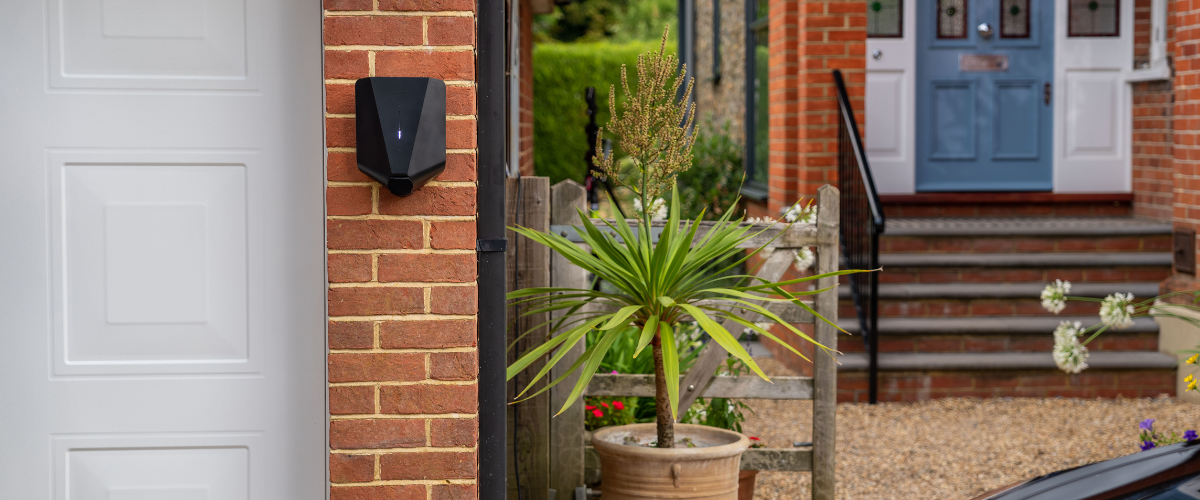
8. An EV charging station that complies with new regulations
The home charger you are getting installed must comply with The Electric Vehicles (Smart Charge Points) Regulations 2021, meaning it’s smart, and not dumb (like a three-pin plug charger). Additionally, the electric car charging port must also have an RCD built into the unit and meet the applicable minimum IP ratings set out in BS EN 61851-1:2019 and BS 7671:2018.
Moreover, the exterior casing of the charger cannot be larger than 0.2 cubic metres.
Our market-leading smart EV chargers comply with all home electric car charger installation regulations, giving you complete peace of mind.
Surge protection devices need to be installed, too. But you can opt out if you wish.
9. Building regulations & electrical safety standards
Several safety standards are set out by the Office for Zero Emission Vehicles (OZEV). Your EV charger installer must comply with these standards.
Here are the current EV charger installation regulations and safety standards:
- BS EN 61851
- The current edition of the IET Wiring Regulations – currently BS 7671
- The recommendations of the IET Code of Practice for Electric Vehicle Charging Equipment Installations (as amended)
- The Electricity Safety, Quality and Continuity Regulations 2002
- The installation should consider the requirements of BS 8300 and the requirements of disabled people.
Do you need planning permission for an EV charger installation?
Typically, planning permission is not required to have an electric vehicle charger installed on your property. If you want your EV charger wall-mounted on your own land and you have off-street parking, you’re good to go.
However, one anomaly is if your property is a listed building or is located in a conservation area. If this is you, you must obtain planning permission for your charger due to the nature of the building.
Summary of home EV charger installation requirements:
Installing a home EV charging point requires careful thought, unlike other typical household appliances and phone chargers. You must consider several key requirements and ensure your EV charging setup is safe, efficient, and follows important regulations.
Here’s a quick overview of the core electric car charger installation requirements:
- Property ownership or landlord permission: You must own the property or have permission from your landlord before proceeding with the car charger installation.
- Parking: The EV charger installation process is straightforward for homeowners with off-street parking. But, for those without (EV drivers who park on-street) must navigate additional steps, including local authority permissions and installing a cross-pavement charging solution.
- Connectivity: A stable Wi-Fi or 4G connection at the charger installation site is essential to enable smart charging features.
- Approved EV charger installers: Use a qualified EV charger installer, preferably one approved by OZEV, such as ourselves, to ensure safety standards are met and to access any available grants.
- Electricity supply: Your home’s power supply must support the electric car charger’s capacity, which may require a potential upgrade by your Distribution Network Operator (DNO). A three-phase electricity supply may be necessary for higher-capacity electric vehicle chargers. Ensure you have your MPAN number to hand when purchasing an EV charger unless the installer is SIP accredited, such as ourselves.
- EV charger installation location: The charger should be installed near your electric meter for cost-effectiveness and accessibility.
Following these guidelines will help make the EV charger installation process smooth, safe, and efficient. Trust an accredited, experienced EV charger installer, and they will guarantee that everything is correctly and safely installed.
In need of an EV charger and EV charger installation?
Choosing an OZEV-approved installer such as We Power Your Car is essential to ensure you have peace of mind that your installation meets all the home EV charger installation requirements – ensuring a safe, straightforward installation.
Our DBS-checked, experienced and accredited expert EV charger installers are far and wide, spanning nationwide. Here are our credentials:
- OZEV-approved
- SIP accredited
- HERS approved
- Trustmark approved
- NICEIC approved
- Safe Contractor approved
- ISO 9001, ISO 14001 and ISO 54001 accredited
Plus, with close ties to leading EV charger manufacturers, we offer a wide range of EV chargers to find your best fit. Trust us for your electric car charger installation, and have the process managed entirely on your behalf. That includes charger choice, DNO application, any grant paperwork and installation. Feel free to browse our Trustpilot reviews – we’re rated 4.9 ‘Excellent’ with over 2,000 reviews – and counting.
Get your EV charger installation booked today. If you are looking to get an EV charger and electric car charger installation at your home, click below to get your free quote, or contact us for more information or any queries you may have.
Don’t forget to browse our big line-up of the UK’s leading smart EV chargers. Or, if you’re struggling, check out our 2026 guide to the best home EV chargers in the UK.
For more information and our latest updates, follow us on Facebook, Instagram, Twitter, LinkedIn and YouTube.
